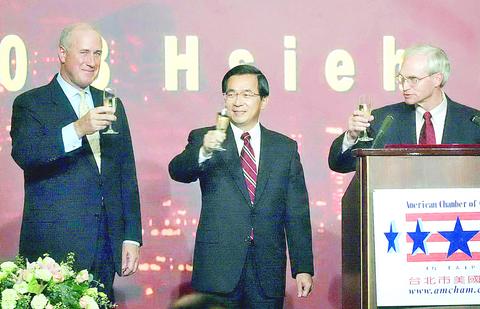De facto US ambassador Douglas Paal sternly warned Taiwan yesterday that it needs to ensure the protection of intellectual property rights (IPR) or risk damaging its economy.
"Ensuring IP protection is the linchpin for Taiwan's economy," Paal told a gathering of US and Taiwanese business leaders yesterday.

PHOTO: CHIANG YING-YING, TAIPEI TIMES
"I also encourage Taiwan to continue to close down the factories making illegal pre-recorded CDs and DVDs."
The enormous economic impact of rampant piracy "diminishes Taiwan's international investment reputation," Paal said.
IPR protection has been a major sticking point in relations between Taiwan and the US. In April, the Office of the United States Trade Representative is expected to place Taiwan back on its Special 301 Priority Watch List of intellectual property violators because the government is not doing enough to stamp out the piracy of movies, music and software.
"Despite positive steps, the lax protection of IPR in Taiwan remains very serious," the 2002 Special 301 report said.
Paal was a guest speaker at the American Chamber of Commerce's annual year-end dinner at the Formosa Regent Hotel in Taipei. Speaking prior to Paal at the event, President Chen Shui-bian (陳水扁) said "Taiwan acknowledges its responsibility and obligation to uphold, defend and protect IPR."
Chen applauded the efforts of the government's anti-piracy task force, saying they investigated 5,000 cases of IPR infringement, filed charges against another 6,000 suspects and seized counterfeit goods worth US$300 million last year.
"Government agencies are also evaluating measures for revising relevant laws that will allow for stiffer penalties for IPR offences and provide greater deterrence," Chen said.
Paal urged the revision of the nation's Copyright Law, allowing police to take the initiative in tackling piracy.
Chen pledged that amendments to the law that take into account US recommendations will be forwarded to the Legislature for review. No timetable for the review has, however, been set.
Paal warned that failure to improve the IPR environment will scare off potential foreign investors.
"Increased attention to IPR enforcement, among others, lay the groundwork for Taiwan to address investor concerns," he said.
Foreign direct investment in Taiwan has plummeted since President Chen took office, falling 33 percent in 2001 to US$5.1 billion. Inbound investment tumbled another 36 percent last year to US$3.3 billion, the Ministry of Economic Affairs' Investment Commission reported yesterday. Figures for January are equally depressing -- down 41 percent in January year-on-year to US$210 million.
At the same time overseas investment in China grew 12.5 percent last year to top US$52.7 billion, the People's Daily reported last month.

SECURITY: As China is ‘reshaping’ Hong Kong’s population, Taiwan must raise the eligibility threshold for applications from Hong Kongers, Chiu Chui-cheng said When Hong Kong and Macau citizens apply for residency in Taiwan, it would be under a new category that includes a “national security observation period,” Mainland Affairs Council (MAC) Minister Chiu Chui-cheng (邱垂正) said yesterday. President William Lai (賴清德) on March 13 announced 17 strategies to counter China’s aggression toward Taiwan, including incorporating national security considerations into the review process for residency applications from Hong Kong and Macau citizens. The situation in Hong Kong is constantly changing, Chiu said to media yesterday on the sidelines of the Taipei Technology Run hosted by the Taipei Neihu Technology Park Development Association. With

CARROT AND STICK: While unrelenting in its military threats, China attracted nearly 40,000 Taiwanese to over 400 business events last year Nearly 40,000 Taiwanese last year joined industry events in China, such as conferences and trade fairs, supported by the Chinese government, a study showed yesterday, as Beijing ramps up a charm offensive toward Taipei alongside military pressure. China has long taken a carrot-and-stick approach to Taiwan, threatening it with the prospect of military action while reaching out to those it believes are amenable to Beijing’s point of view. Taiwanese security officials are wary of what they see as Beijing’s influence campaigns to sway public opinion after Taipei and Beijing gradually resumed travel links halted by the COVID-19 pandemic, but the scale of

A US Marine Corps regiment equipped with Naval Strike Missiles (NSM) is set to participate in the upcoming Balikatan 25 exercise in the Luzon Strait, marking the system’s first-ever deployment in the Philippines. US and Philippine officials have separately confirmed that the Navy Marine Expeditionary Ship Interdiction System (NMESIS) — the mobile launch platform for the Naval Strike Missile — would take part in the joint exercise. The missiles are being deployed to “a strategic first island chain chokepoint” in the waters between Taiwan proper and the Philippines, US-based Naval News reported. “The Luzon Strait and Bashi Channel represent a critical access

Pope Francis is be laid to rest on Saturday after lying in state for three days in St Peter’s Basilica, where the faithful are expected to flock to pay their respects to history’s first Latin American pontiff. The cardinals met yesterday in the Vatican’s synod hall to chart the next steps before a conclave begins to choose Francis’ successor, as condolences poured in from around the world. According to current norms, the conclave must begin between May 5 and 10. The cardinals set the funeral for Saturday at 10am in St Peter’s Square, to be celebrated by the dean of the College